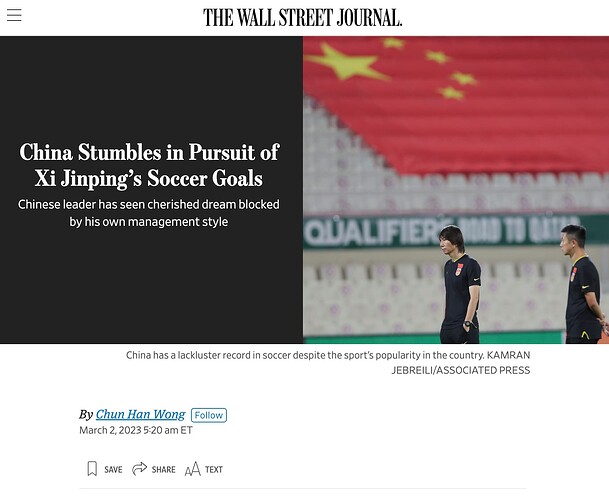-
中国领导人习近平多年来一直在推动将中国转变为一个足球强国,但成效有限。
-
男子国家队仍然落后于其他国家,顶级职业球队由于流行病的干扰和房地产市场的低迷而失去了收入。
-
反贪污检查员最近对中国一些最知名的足球人士进行了调查,包括中国足球协会主席。
-
即使是青年级别的比赛也受到了影响,广东一场15岁以下的比赛中出现的可疑结果引发了一场假球调查。
-
总部设在北京的中国体育产业分析家马克-德雷尔说,足球的成功需要一种自下而上的方法和基层发展,但政治正阻碍着它。
-
中国足球的不成功反映了自上而下控制的局限性,以及对足球运动进行更多基层发展和投资的必要性。
-
本地体育作家Wang Qi在最近的报纸专栏中用一句中国谚语"屋漏偏逢连夜雨,船迟又遇打头风"表达了对中国足球现状的失望。这反映了自2015年以来中国足球命运的逆转,当时习主席推出了一个50点计划,以提升中国的足球运动。尽管拥有约1亿名球迷,但中国的男子国家队只进入过一次世界杯。
-
在2018年世界杯期间,当他们的亚洲邻国日本和韩国对欧洲顶级球队取得令人震惊的胜利时,手忙脚乱的情况有所增加。国营报纸《中国日报》称,需要 "彻底重启 "以拯救中国足球。
-
中国足球协会和中国体育总局没有回应询问。这进一步强调了中国足球系统需要进行大刀阔斧的改革,以实现习主席的崇高目标。
-
习近平自称是个足球迷,并表示希望中国队成为世界上最好的球队之一。
-
中国企业家对国内外的球队和设施进行了大量投资。
-
中超联赛在冬季球员转会窗口期间花费了4亿多美元购买球员。
-
在习近平的领导下,共产党对社会进行微观管理的愿望更加强烈。
-
这就扼杀了足球发展所需的主动性和创新性。
-
当中国政治精英本周末在北京集会时,中国足球的状况为习近平的集权领导风格的缺点提供了一个窗口。
-
尽管他的个人目标是使中国队成为世界上最好的球队之一。
-
在广东四年一度的15岁以下男子足球锦标赛的冠军赛中,沮丧的球迷注意到了一场不寻常的比赛,其中一支球队在取得3-1的领先后似乎丢掉了胜利。
-
这场比赛的录像在中国的社交媒体上疯传,用户们对他们认为是操纵的结果感到愤怒。
-
党和国家的调查人员后来裁定这场比赛是被操纵的,并处罚了16名官员,其中包括被解职的广东最高体育管理者。
-
业内人士称,这一事件凸显了体育管理中的系统性问题,许多官员只关注在其任期内可以实现的短期结果。
-
中国足球网络博主Zhang Peipei通过在社交媒体上发布比赛录像,引起了人们对广东案件的关注,他指出,绝大多数假球案件都是由政治得分和奖金驱动。
-
短期思维也是支撑许多中国足球俱乐部的脆弱财政模式的基础,随着新冠疫情和防疫控制对经济的打击,球队和他们的公司所有者的收入减少,这种模式也解体了。
-
由中国零售商苏宁电器集团有限公司拥有的江苏足球俱乐部在2021年初宣布解散,理由是超出其控制范围的未指明的因素。
-
中国的房地产市场不景气对中国超级联赛(CSL)产生了影响,许多球队被房地产公司控制或持有股份。
-
去年,三家中超俱乐部和五家二级球队因未能支付球员工资而被扣分,一家俱乐部完全退出了职业足球。
-
许多球队缺乏可持续的商业模式,依靠企业投资者的 “输血”,导致了广泛的腐败。
-
11月,当局宣布对2020年至2021年的中国男子国家队主教练李铁和其他三名中国足协高级官员的涉嫌不法行为进行调查。
-
在2月15日的会议上,中国足协高级官员赞扬了这些调查,并承诺继续以习近平先生的政治理念为指导进行足球改革。
-
近年来,习近平先生在公开场合很少谈及中国足球的命运。
-
体育和地缘政治经济教授西蒙-查德威克认为,中国已经认识到,它无法控制或操纵一切。
-
人的才能,特别是高质量的人的才能,需要很长时间来培养。
-
Chinese leader Xi Jinping has been pushing to transform China into a soccer powerhouse for years, but has had limited success.
-
The men’s national team still lags behind other countries, and top professional teams have lost revenues due to pandemic disruptions and a property-market slump.
-
Antigraft inspectors have recently gone after some of China’s most prominent soccer personalities, including the president of the Chinese Football Association.
-
Even youth levels of the game have been affected, with a suspicious result in an under-15 match in Guangdong sparking a match-fixing probe.
-
Mark Dreyer, a Beijing-based analyst of China’s sports industry, says that success in soccer requires a ground-up approach and grassroots development, but politics is getting in the way.
-
The lack of success in Chinese soccer reflects the limits of top-down control and the need for more grassroots development and investment in the game.
-
Wang Qi, a local sportswriter, expressed dismay at the state of Chinese soccer in a recent newspaper column using a Chinese proverb. This reflects the reversal of China’s soccer fortunes since 2015, when President Xi launched a 50-point program to elevate the sport in the country. Despite having an estimated 100 million fans, China’s men’s national team has only reached the World Cup once.
-
Hand-wringing increased during the 2018 World Cup when their Asian neighbors Japan and South Korea snagged shock victories against top European teams. The state-run newspaper China Daily said that a “complete reboot” is needed to save Chinese soccer.
-
The Chinese Football Association and China’s General Administration of Sport did not respond to queries. This further emphasizes the need for a drastic change in the Chinese soccer system in order to reach President Xi’s lofty goals.
-
Xi Jinping is a self-professed soccer fan and has expressed his desire for the Chinese team to be one of the best in the world.
-
Chinese entrepreneurs have invested heavily in teams and facilities at home and abroad.
-
The Chinese Super League spent more than $400 million on players during the winter player-transfer window.
-
The Communist Party’s desire to micromanage society has intensified under Xi.
-
This is stifling the initiative and innovation needed to develop soccer.
-
When the Chinese political elite assembles in Beijing this weekend, the state of Chinese soccer offers a window into the shortcomings of Xi’s centralized leadership style.
-
This is despite his personal goals to make the Chinese team one of the best in the world.
-
Frustrated fans noticed an unusual spell of play in the championship game of a quadrennial under-15 boys’ soccer tournament in Guangdong, where one team seemingly threw away victory after storming to a 3-1 lead.
-
Footage from the game went viral on Chinese social media, where users raged over what they saw as a rigged result.
-
Party and state investigators later ruled that the match was fixed and punished 16 officials, including Guangdong’s top sports administrator, who was dismissed.
-
Industry insiders say the incident underscores systemic problems in sports governance, where many officials focus on short-term results achievable within their tenures.
-
Zhang Peipei, a Chinese soccer writer, drew attention to the Guangdong case by posting game footage on social media, noting that the vast majority of match-fixing cases are driven by political point-scoring and prize money.
-
Short-term thinking also underpinned the tenuous financial model propping up many Chinese soccer clubs, which unraveled as Covid-19 and pandemic controls battered the economy and slashed revenues for teams and their corporate owners.
-
Jiangsu Football Club, owned by Chinese retailer Suning Appliance Group Co., announced its dissolution in early 2021, citing unspecified factors beyond its control.
-
China’s property-market slump has weighed on the Chinese Super League (CSL), with many of its teams being controlled or held stakes in by real-estate companies.
-
Three CSL clubs and five second-tier teams had points deducted for failing to pay players last year, with one club withdrawing from professional soccer altogether.
-
Many teams lack sustainable business models and rely on “blood transfusions” from corporate investors, leading to widespread corruption.
-
In November, authorities announced investigations into suspected wrongdoing by Li Tie, the Chinese men’s national team head coach from 2020 to 2021 and three other senior CFA officials.
-
At a Feb. 15 meeting, senior CFA officials praised the investigations and pledged to continue pursuing soccer reforms with Mr. Xi’s political philosophy as a guide.
-
Mr. Xi has said little in public about China’s soccer fortunes in recent years.
-
Simon Chadwick, a professor of sports and geopolitical economy, believes that China has learned that it cannot control or manipulate everything.
-
Human talent, particularly top-quality human talent, takes a long time to develop.
链接:China Stumbles in Pursuit of Xi Jinping’s Soccer Goals - WSJ
